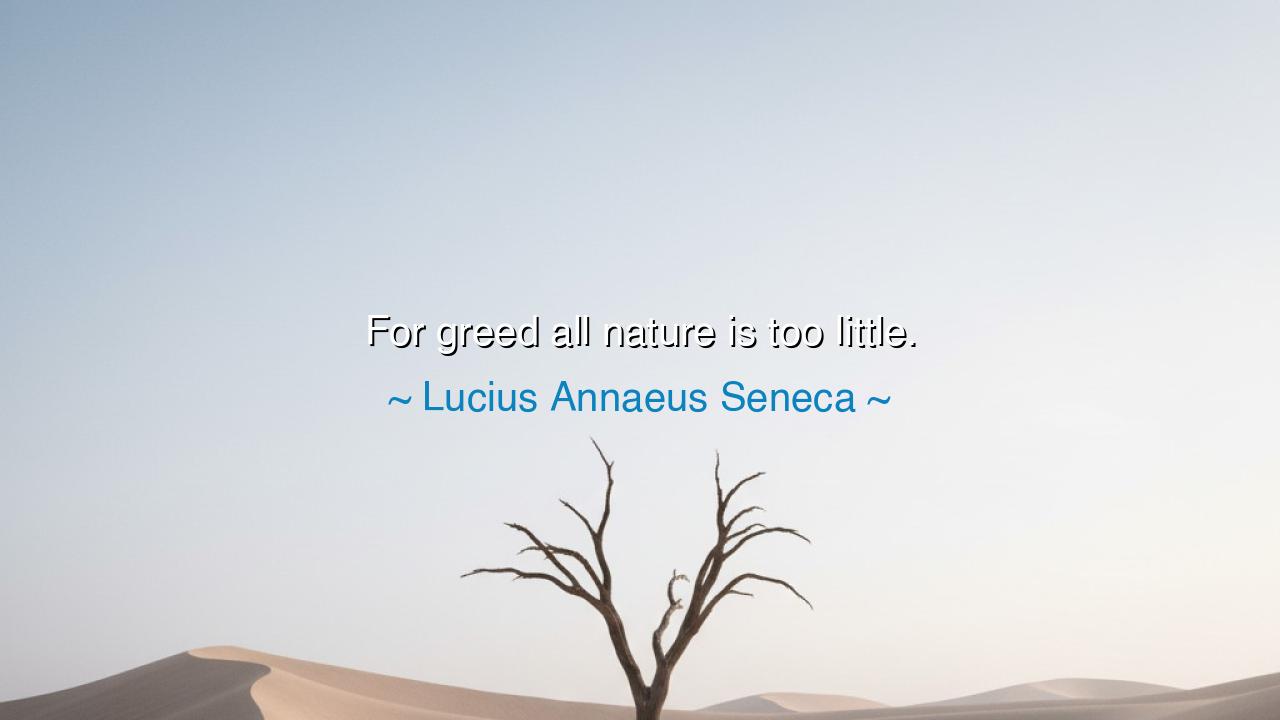
For greed all nature is too little.






Hearken, O children of the ages, to the piercing truth of Seneca, the Stoic sage, who spoke with the clarity of the eternal: “For greed, all nature is too little.” In this utterance lies a solemn admonition, a warning against the insatiable desire that gnaws at the heart of man. Nature, in its bounty, offers streams, forests, mountains, and seas; it provides air, fire, soil, and sustenance beyond measure. Yet to the heart consumed by avarice, all of creation, even the infinite expanse of the cosmos, is insufficient. Such is the peril of greed: it transforms abundance into emptiness and gifts into chains.
Seneca, writing in the shadow of Rome’s grandeur and decadence, observed how men, in their thirst for wealth and power, could never find contentment. Palaces rose, gold flowed, and empires stretched their hands across the earth, yet the desire of the soul remained unquenched. He teaches that the nature of greed is endless—it feeds upon itself, devours peace, and blinds the mind to joy already present. No harvest, no treasure, no conquest can sate it; it is the ever-hungry flame that reduces even riches to ashes in the heart.
Consider the tale of Mansa Musa, emperor of Mali, whose wealth was legendary. Though his riches dazzled nations and cities, even he could not escape the human temptation of boundless desire. Stories tell of gold spent freely, of generosity unmatched, yet history whispers of the cost to his people when resources were diverted to satisfy the unceasing appetite for display and glory. Here lies the echo of Seneca’s warning: the largesse of the world cannot fill a heart that covets without end.
The Stoic teaching extends beyond wealth to all forms of desire. Greed manifests in power, in status, in acclaim, and in indulgence. It twists the soul into a perpetual state of disquiet, for it always looks outward, never inward. Nature, with its mountains, rivers, and endless skies, is vast beyond comprehension, yet the heart grasping for more remains forever unsatisfied. Seneca exhorts the wise to measure desire against reason and virtue, to cultivate moderation, and to recognize the sufficiency of what is naturally given.
Even in our modern age, we witness the echoes of this ancient truth. Corporations amass fortunes beyond imagining, nations extend their reach, and individuals chase possessions with relentless urgency. Yet the anxious, grasping heart finds no peace. The lesson is eternal: contentment is found not in acquisition but in understanding limits, in valuing what suffices, and in tempering desire with wisdom. Nature, generous as it is, cannot nourish the soul of the greedy; only reflection and restraint can.
Seneca’s wisdom is also a call to humility. The human being, though capable of creation, achievement, and innovation, remains a creature of the natural world, subject to its laws and rhythms. To covet beyond one’s need is to defy both reason and the harmony of the cosmos. History, from the fall of empires to the collapse of financial dynasties, reveals that unchecked greed carries the seeds of ruin, for no accumulation can forestall the inevitable decay of all things.
Let us, then, take this truth to heart. Measure your desires, guard your intentions, and cultivate the virtues of temperance, gratitude, and moderation. Recognize that what is necessary for life and what is enough is often simple, yet greed blinds the eye and poisons the spirit. Look to nature, not as a treasure to be hoarded, but as a guide to sufficiency, a model of balance, and a teacher of humility. In this way, one may live in harmony with both the world and the self.
O children of the ages, hear this and act: let not your heart be a vessel without end, forever empty, forever longing. Embrace sufficiency, temper your desires, and let virtue guide your accumulation of wealth, power, and pleasure. For in the stillness of contentment, in the temperance of desire, the soul finds freedom, the mind finds peace, and the bounty of nature becomes, at last, more than enough.
If you wish, I can also craft a practical guide to overcoming greed inspired by Seneca, showing daily actions and mindset shifts to cultivate moderation and contentment. Do you want me to do that?






AAdministratorAdministrator
Welcome, honored guests. Please leave a comment, we will respond soon